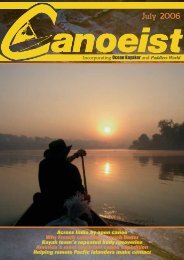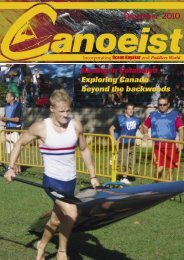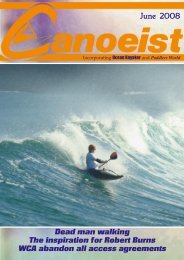November 2006 - Canoeist Magazine
November 2006 - Canoeist Magazine
November 2006 - Canoeist Magazine
You also want an ePaper? Increase the reach of your titles
YUMPU automatically turns print PDFs into web optimized ePapers that Google loves.
QuickTide South West<br />
1 902830 33 4<br />
QuickTide South East<br />
1 902830 34.2<br />
QuickTide North<br />
1 902830 35 0<br />
QT International Ltd, 19 Canynge Rd,<br />
Bristol BS8 3JZ<br />
220 x 150mm<br />
£7.99 + P&P (free on more than one)<br />
Once again the QuickTide cards are<br />
available. Pick a date code from the table<br />
inside, pick a colour code from the relevant<br />
section of coast on the map, line up the dials<br />
and you have the approximate tide times, not<br />
perfect but better than getting the<br />
calculations wrong. Tide times do vary from<br />
the predictions, anyway, because of changes<br />
to the atmospheric conditions.<br />
The one significant change this year is to<br />
the southwest card which now has an inset<br />
for the whole of Ireland. This is a bit<br />
squashed as far as the section between Dublin<br />
and Wexford is concerned but that section<br />
appears at larger scale on the main map. No<br />
attempt is made to give details between<br />
Portrush and Belfast Lough, either in the<br />
inset here or on the northern map.<br />
Even if you need to do the full calculations<br />
to catch a particular tidal flow or slack it<br />
would do no harm to run a quick check with<br />
the cards to ensure you have not made a<br />
major slip.<br />
Fallen Pieces of the Moon<br />
Robin Lloyd-Jones<br />
Whittles Publishing, Dunbeath Mains<br />
Cottages, Dunbeath, Caithness KW6<br />
6EY<br />
1 904445 31 4<br />
<strong>2006</strong><br />
240 x 170mm<br />
109 pages, paperback<br />
£14.99<br />
We have waited a long time for the<br />
sequel to Argonauts of the Western Isles (Jan<br />
90, p41). This time it is just a single trip,<br />
a fairly exotic location (west Greenland)<br />
but nothing too extreme. Robin is with a<br />
holiday group, mostly North Americans,<br />
undertaking a 240km tour over a couple of weeks.<br />
It is a travel book as much as a sea kayak book. Indeed, it is a<br />
philosopher’s book as it goes off at frequent tangents to probe<br />
interesting ideas, often comparing and contrasting with Scottish<br />
experience, including the fir-men of the north. Historic journeys and<br />
low tech navigation methods echo and complement those in The<br />
Barefoot Navigator and there is exploration of the area by Vikings and<br />
later Europeans, Inuit kayaks and endless interesting facts which will<br />
make it essential background reading for anyone going into the Arctic.<br />
As before, he worries about whether describing one of the world’s<br />
pristine places will encourage others to go there, leading to its<br />
downfall, but concludes that it is better that others share the pleasure<br />
than for it to be reserved for the elite few.<br />
There are a limited number of colour and black and white pictures,<br />
30<br />
CANOEIST <strong>November</strong> <strong>2006</strong><br />
some from other trips, particularly by Ken Nicol. There is humour of<br />
the kind ‘From years of kayaking in Scotland I’d run foul of several<br />
little known sub-clauses to Sod’s Law, like the one which decrees that<br />
no matter how much you eat, there’s always something that won’t fit<br />
back in your kayak when you come to repack it; or the one which<br />
ensures that, when you need to consult your map, you’re bound to be<br />
located on the fold.’<br />
There is a priceless end to a section on naming places. ‘The river at<br />
the head of Frobisher Bay, Hall named Cynthia Grinnel River.<br />
Unfortunately, on returning home, he found that his friend’s daughter<br />
was called Sylvia, not Cynthia.’<br />
Statements are put devastatingly simply. ‘I love islands you can walk<br />
right round in a short space of time... It is part of the lure of islands of<br />
this size, I think, that they fit inside your heart.’<br />
I appreciate his problems of scaling, a hunter stalking a grizzly for an<br />
hour to discover it was a marmot or grassland pygmies not used to<br />
extensive views who were frightened at how a swarm of flies grew to<br />
be the size of buffaloes. I have paddled along a beach to a man who<br />
turned out to be a gull.<br />
If you are into sea kayaks or even the wider aspects of travel you will<br />
find this a fascinating read with a succession of interesting ideas along<br />
with the paddling narrative.<br />
A Better Place to Play<br />
Environment Agency, Rio House,<br />
Waterside Drive, Aztec W,<br />
Almondsbury, Bristol BS32 4UD<br />
A4<br />
19 pages, paperback<br />
‘Is that it?’ was the comment of<br />
one of the newspaper journalists<br />
and TV crew members who had<br />
been invited in by the EA some<br />
years ago to witness the opening of<br />
a launch platform they had<br />
provided for canoeists at Blandford,<br />
round the corner from dozens of<br />
angling platforms. Much the same<br />
could be said of the access<br />
achievements trumpeted by this<br />
book. This summary report by the<br />
EA selects what they want from the<br />
Brighton University report which selected what they wanted from this<br />
study.<br />
The opening sentence reads ‘This study has demonstrated that, in<br />
the vast majority of cases, approaches to secure canoe access by<br />
voluntary agreement are successful.’ It has done nothing of the sort. It<br />
shows the inadequacy of what has been done this time and makes light<br />
of all the constraints and failures.<br />
‘Many previous attempts to negotiate agreements have foundered<br />
through lack of clear processes, resources, strategic support and<br />
guidance.’ The guidance we did have was the much vaunted books<br />
successively by the NRA and EA on how to make agreements, not<br />
mentioned here. Certainly there has been lack of strategic support<br />
from the EA, not surprisingly, considering the attitudes of successive<br />
chairmen, but the present financial support and DEFRA pressure on<br />
participants are unlikely to continue in the future and it is open to<br />
question whether the present agreements will survive for any time at<br />
all.<br />
The book has a list of requirements before access is obtained,<br />
perhaps a surprise to the Scots who have access a thousand times better<br />
than this, virtually without any of these.<br />
Finally, the implication is that it will be the BCU’s fault if it all goes<br />
wrong. After half a century of effort by their team of well over a<br />
hundred negotiators and very little to show for it, it is hardly fair for<br />
some well paid newcomer to pick off some easy bits of river, fail on<br />
much more and say that canoeists have not been doing the job<br />
properly.<br />
It might be worth having a copy of this book to produce at a later<br />
date with the previous ones on how dumbos like us could make access<br />
agreements if only we knew how.





